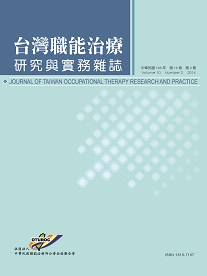Journal of Taiwan Occupational Therapy Research and Practice

半年刊,正常發行
目的:思覺失調症患者因認知能力不佳,容易阻礙其發揮和貢獻所長並融入社會當中,也會造成醫療與社會成本之增加。因此本研究希望藉由認知復健治療加上職業復健以增進思覺失調症患者的認知功能,進而提升其就業競爭力與穩定性。方法:本研究於新北市、桃園、臺南及高雄四地區收集實驗組共25人,提供十週的職前訓練團體輔以電腦化認知復健治療,以增進其注意力、記憶力及邏輯等認知功能;並於基隆及臺中兩地區收集對照組23人,提供職前訓練團體,但不另外施以認知復健治療。且於治療的前後,研究者評估受試者各項認知功能表現—包括注意力、記憶力、執行功能及症狀。結果:認知測驗方面,兩組在記憶表現上在訓練課程後皆達顯著水準 (p < .05 & p < .001),而實驗組成員則特別在視覺立即記憶及聽覺記憶的保留表現上達顯著水準 (p < .05)。症狀方面,實驗組的前後測結果顯示,負性症狀有改善,特別是身體化症狀之下降 (p < .05)及憂鬱程度之降低 (p = .05)。結論:持續十週、每週一次的職前訓練輔以每週三次的電腦化認知復健治療,能促進個案的視覺及聽覺記憶,和試誤學習上的表現,並且可降低個案的負性症狀。職前訓練本身較無上述方面的改善。
Objective: Poor cognitive function of people with psychiatric disabilities limits their ability for full community participation, and results in increased medical and social costs. This study aims to use neurocognitive rehabilitation combined with pre-vocational training to improve the cognition of people with psychiatric disabilities and their capability and stability in work. Methods: Twenty-five participants from 4 intervention groups in New Taipei City, Taoyuan, Tainan, and Kaohsiung and 23 participants from 2 control groups in Keelung and Taichung were recruited. The participants in the experimental group participated in a computer-assisted cognitive rehabilitation therapy and pre-vocational training program for 10 weeks, while the control group was provided with only pre-vocational training. Assessments in cognition--including attention, memory, and executive function--and symptoms were conducted immediately before and after the program. Results: In the performance of cognition, both the experimental and control groups had significant differences in memory before and after the 10-week training program (p < .05 & p < .001). The experimental group showed better immediate visual memory and retained auditory memory (p < .05) after intervention than before intervention. Furthermore, the experimental group also showed better improvement in negative symptoms--especially in somatic symptom (p < .05) and depression (p < .1) after intervention than before intervention. Conclusion: The experimental group combined pre-vocational training program with neurocognitive rehabilitation three times a week, which showed better improved outcomes in the aspect of the visual and auditory memory, learning of trial-and error, and negative symptoms of people with psychiatric disabilities after intervention than before intervention. The control group did not exhibit the aforementioned gains after intervention.












